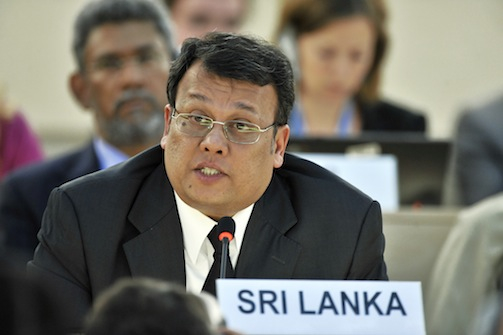
India has already come out and announced that it too will support the resolution –taking a bit of drama out of the whole affair. But it’s also quite revealing because it shows how much the administration of President Mahinda Rajapaksa has overplayed its hand. Let us not forget that less than a year ago, Delhi was reminding people that itwouldn’t support any country-specific resolution at the HRC. Now it looks like Delhi will have supported two in a twelve-month span.
Along with the major international organizations like International Crisis Group (ICG) and Human Rights Watch (HRW), there are probably a few Western countries – though not necessarily the US – that are pushing for something stronger than the draft resolution in its current form. In spite the circumstances, the Government of Sri Lanka (GoSL) is still sticking with its (untrue) story – saying that they are doing all they can to implement the LLRC recommendations and comply with the previous HRC resolution. Unfortunately, the problems with the GoSL’s most recent progress report on the LLRC recommendations start on the first page of the first sentence.
As per the document published on February 26th:
The Ministry has established a Steering Committee of eight members to streamline and coordinate the implementation of LLRC recommendations carried out by the Armed Forces and the Police. The Committee is authorized to summon any member of the Armed Forces and the Police or any other relevant agency to discuss any specific issue and furnish any information that may be required with regard to any matter that comes under the purview of the Ministry Steering Committee.
Maybe the Steering Committee will not play a major role or perhaps the military will select some truly impartial individuals to be a part of the committee – though the latter is highly unlikely.
My sense is that most people concerned about Sri Lanka’s democratic deficiencies are hoping for security personnel to be less involved in the implementation of the LLRC recommendations.
The implementing and monitoring agencies the GoSL likes to rely upon – including the Ministry of Defence (MOD), the Ministry of Justice (MoJ) and the Attorney-General’s Department (AGD) are not unbiased actors. On the contrary, they’re often the most consistent violators of democratic principles and the norms of responsible governance – including the crimes they are supposed to be investigating impartially. Yet GoSL appears unwilling to compromise on this issue and, instead, is still emphasizing that it will rely heavily on institutions like the MoD to implement the LLRC recommendations.
The problems continue with the first two recommendations that are mentioned in the document, recommendations 9.9 and 9.37, call for an examination of war deaths and injuries for civilians and accountability for perpetrators. Yet, under the “Progress” heading the GoSL has cited the Court of Inquiry (CoI) by the Sri Lankan Army. (Again, there are obvious conceptual and practical problems with the Sri Lankan Army examining itself).
The distortions and inconsistencies continue from there. More generally, the document itself is vague and noncommittal. Due to GoSL inaction, the regime is forced to highlight many of the things that it will do, as opposed to what it’s already accomplished. Though the GoSL has also woven in blatant lies with talk about the military’s withdrawal from civilian affairs (including its use of private lands) being a case in point. On page eight for recommendations 9.171, 9.227, under the “Progress” heading, the GoSL has noted that these recommendations have been “completed.” The GoSL goes on to note that “Civilian administration is fully functional with government officials at the district, divisional and grassroots levels appointed and discharging their functions.”
What tripe. Bottom line: this is not a progress report to be taken seriously.
Events in Geneva
Some people have suggested that the US might just be talking about a weak resolution because they want to set the bar low and make sure they aren’t embarrassed in Geneva. While possible, it’s very unlikely that that’s what’s actually happening.
Striking a cord of even more unbridled optimism, a colleague recently suggested that the US is still keen on accountability and human rights in Sri Lanka, but that they don’t want to seem too pushy for obvious reasons. And, along these lines, the US might have its eyes set on a resolution with real teeth the following year – in 2014.
I could not disagree more strongly with this line of thinking.
The fact that the US has already sponsored one resolution is mildly incredible. The passage of two resolutions would be historic. Do people honestly believe that three US sponsored resolutions on Sri Lanka – in a span of three years – should be expected?
Putting the question of accountability aside for a moment, the GoSL was given a chance to implement (at least) some of the recommendations prescribed in the LLRC without interference. It failed to do that. Then the GoSL was given a chance to comply with HRC Resolution. It failed to do that too.
Ultimately, change must come from within, but if international pressure is going to work at all, the people concerned need to turn up the heat – and they need to do that now. The administration of Barack Obama’s pivot to Asia is irreversible – but it’s an initiative solidly grounded in security concerns and economics – not human rights. There will be no human rights pivot to Asia during a second Obama administration – which is yet another reason to wish that someone else would lead the way this March in Geneva.